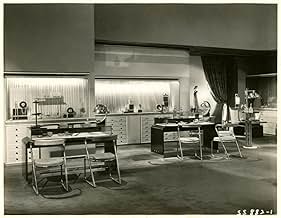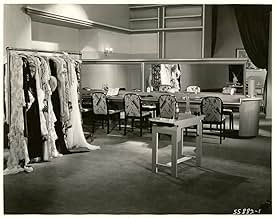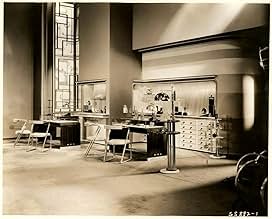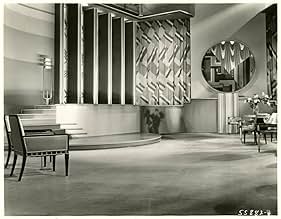A New York fashion model finds herself being pursued by a poor but honest garage mechanic and a rich philanderer.A New York fashion model finds herself being pursued by a poor but honest garage mechanic and a rich philanderer.A New York fashion model finds herself being pursued by a poor but honest garage mechanic and a rich philanderer.
Rita La Roy
- Lil
- (as Rita LaRoy)
Reginald Barlow
- Mr. Blake
- (uncredited)
Lynn Browning
- Fashion Model
- (uncredited)
Veda Buckland
- Emma
- (uncredited)
Edna Callahan
- Fashion Model
- (uncredited)
Russ Clark
- Fred Blake
- (uncredited)
Dorothy Compton
- Fashion Model
- (uncredited)
Mary Cooper
- Fashion Model
- (uncredited)
Luke Cosgrave
- Grandfather Blake
- (uncredited)
Frank Darien
- Garage Mechanic
- (uncredited)
Lillian Elliott
- Jimmie's Landlady
- (uncredited)
6.0438
1
2
3
4
5
6
7
8
9
10
Featured reviews
Know thy place!
As pre-code movies go, this is a great, well-produced and entertaining example. Everything you'd expect is here: The Depression, thwarted aspirations, class conflict, beautiful leading ladies (in sexy lingerie of course) plus good old fashioned moralising.
If you enjoy pictures from this period, you mustn't overlook this often overlooked one. The multi-layered characters are written with depth and realism - they're not the flat dimensionless cartoons who so often appear in films from this era. The story is pretty well trodden but scripted here with life and wit. The theme is that old chestnut: poor girl is seduced by rich man but this time it's doubled up because we get a poor boy (the poor girl's ex) who is also seduced by a rich girl.
Like a Warner Brothers picture, its point of view is from the perspective of the working class people but refreshingly the society characters are not soulless evil villains twiddling their moustaches. They are portrayed as real people too as well with real issues. Their attitudes and sense of entitlement however is cleverly and heavily criticised particularly the way both rich playboy Eric and society gal Claire treat their working class lovers like pets, loved pets yes but not like "their" people. But it's not their fault - it's just the way they are and it reflects the stratified unequal society of the time.
At Belfast's Titanic exhibition, it's explained how imperative it was to separate the 1st and 2nd class passengers from those in 3rd class. It seems crazy to us now that so much effort was put into ensuring that 'nice' people would never ever have the awful experience of actually seeing a poor person. As we see in this fabulous film, if the two classes of people even just see each other, disaster awaits! This treats the horrible disparity between the haves and have-nots in a much more light hearted way than other films but nevertheless still stirs a sense of outrage. This aspect is even subtly imbued in the inevitable girls' dressing room scenes. The rich guys see nothing wrong with walking in on them as are getting changed because they're rich and they're just working class girls. One of those girls might be lucky if Mr wealthy decides to pluck them from their life of drudgery. Welcome to the 1930s!
Besides a profusion of young ladies in their underwear, one big reason to watch this isn't that bloke from Bristol, it's Adrienne Ames! She wasn't really an actress, she didn't make too many pictures, she was 'The celebrity' of the age. Her acting isn't that convincing but she certainly lights up the screen and it's great to see her in a rare leading role.
If you enjoy pictures from this period, you mustn't overlook this often overlooked one. The multi-layered characters are written with depth and realism - they're not the flat dimensionless cartoons who so often appear in films from this era. The story is pretty well trodden but scripted here with life and wit. The theme is that old chestnut: poor girl is seduced by rich man but this time it's doubled up because we get a poor boy (the poor girl's ex) who is also seduced by a rich girl.
Like a Warner Brothers picture, its point of view is from the perspective of the working class people but refreshingly the society characters are not soulless evil villains twiddling their moustaches. They are portrayed as real people too as well with real issues. Their attitudes and sense of entitlement however is cleverly and heavily criticised particularly the way both rich playboy Eric and society gal Claire treat their working class lovers like pets, loved pets yes but not like "their" people. But it's not their fault - it's just the way they are and it reflects the stratified unequal society of the time.
At Belfast's Titanic exhibition, it's explained how imperative it was to separate the 1st and 2nd class passengers from those in 3rd class. It seems crazy to us now that so much effort was put into ensuring that 'nice' people would never ever have the awful experience of actually seeing a poor person. As we see in this fabulous film, if the two classes of people even just see each other, disaster awaits! This treats the horrible disparity between the haves and have-nots in a much more light hearted way than other films but nevertheless still stirs a sense of outrage. This aspect is even subtly imbued in the inevitable girls' dressing room scenes. The rich guys see nothing wrong with walking in on them as are getting changed because they're rich and they're just working class girls. One of those girls might be lucky if Mr wealthy decides to pluck them from their life of drudgery. Welcome to the 1930s!
Besides a profusion of young ladies in their underwear, one big reason to watch this isn't that bloke from Bristol, it's Adrienne Ames! She wasn't really an actress, she didn't make too many pictures, she was 'The celebrity' of the age. Her acting isn't that convincing but she certainly lights up the screen and it's great to see her in a rare leading role.
Money can't buy happiness
Remember all those Jean Harlow movies about poor girls wanting to marry rich fellows? If you liked them, check out Carole Lombard and Chester Morris in Sinners in the Sun. Ironically, the same year, Chester played the rich fellow in Jean Harlow's Red-Headed Woman. In this movie, he's a poor garage mechanic in love with Carole. He wants to get married, but she's afraid of a life of poverty. Given her background and growing up in the Great Depression, it's understandable.
Carole and Chester part ways in search of wealthy partners. Carole finds a married man who wants fun on the side, and Chester finds a wealthy woman who likes how he looks in a tuxedo. This pre-Code drama is a bit naughty, with see-through negligees and references to gigolos. Mostly, though, it's a tragedy about two people who think they'll be happier with money than with love. It's always a treat to see Carole in a drama, and Chester gives a great performance as he struggles with his pride. "Did you think I'd cry?" he asks, his voice breaking, when reunited with Carole after they've settled into other lives. If you like this one, check out Swing High, Swing Low.
DLM Warning: If you suffer from vertigo or dizzy spells, like my mom does, this movie might not be your friend. About 45 minutes in, and at 52 minutes in, the camera spins for about thirty seconds, and that will make you sick. In other words, "Don't Look, Mom!"
Carole and Chester part ways in search of wealthy partners. Carole finds a married man who wants fun on the side, and Chester finds a wealthy woman who likes how he looks in a tuxedo. This pre-Code drama is a bit naughty, with see-through negligees and references to gigolos. Mostly, though, it's a tragedy about two people who think they'll be happier with money than with love. It's always a treat to see Carole in a drama, and Chester gives a great performance as he struggles with his pride. "Did you think I'd cry?" he asks, his voice breaking, when reunited with Carole after they've settled into other lives. If you like this one, check out Swing High, Swing Low.
DLM Warning: If you suffer from vertigo or dizzy spells, like my mom does, this movie might not be your friend. About 45 minutes in, and at 52 minutes in, the camera spins for about thirty seconds, and that will make you sick. In other words, "Don't Look, Mom!"
Just One of Those Things
A beautifully written and sometimes magnificently played serious movie. Chester Morris and Carole Lombard love each other, but she is terrified of the corrosive effects of the life of poverty that she foresees with Morris. So they break up and drift into lives as a kept woman and a gigolo.
The two are almost perfect in their roles; Chester Morris plays a character who is almost unable to phrase a clear thought and pulls it off beautifully, for a wonderful payoff scene. Miss Lombard only fails in one scene, towards the end, when she is contemplating suicide: I blame the heavy-handed direction of it rather than her performance. But the movie is riddled with wonderful performances: the always excellent Alison Skipworth as Lombard's supportive mother; Reginald Barlow as the father who gives her no chance; Adrienne Ames and Walter Byron as their likable seducers. Particularly good is Rita La Roy, an actress whom I have never noticed before, as a kept woman who kills herself -- alas, this was her best part in the movies, After her career faded out she sold yachts. Cary Grant is also present in a small role, in his second movie, but if you're not paying attention to the soundtrack you could easily miss him: his voice was far more distinctive than his good looks at this stage of his career.
There is a happy ending, but it feels forced. That is the one flaw in this movie. Otherwise it is well worth your time.
The two are almost perfect in their roles; Chester Morris plays a character who is almost unable to phrase a clear thought and pulls it off beautifully, for a wonderful payoff scene. Miss Lombard only fails in one scene, towards the end, when she is contemplating suicide: I blame the heavy-handed direction of it rather than her performance. But the movie is riddled with wonderful performances: the always excellent Alison Skipworth as Lombard's supportive mother; Reginald Barlow as the father who gives her no chance; Adrienne Ames and Walter Byron as their likable seducers. Particularly good is Rita La Roy, an actress whom I have never noticed before, as a kept woman who kills herself -- alas, this was her best part in the movies, After her career faded out she sold yachts. Cary Grant is also present in a small role, in his second movie, but if you're not paying attention to the soundtrack you could easily miss him: his voice was far more distinctive than his good looks at this stage of his career.
There is a happy ending, but it feels forced. That is the one flaw in this movie. Otherwise it is well worth your time.
Sinners in the Sun review
A young couple's relationship is threatened by his lack of success. An enjoyable romantic drama featuring a young Carole Lombard as a fashion model - which, as this is a pre-Code movie, means lots of shots of women in lingerie - and Chester Morris as a garage mechanic who eventually marries a socialite after becoming her chauffeur. It's the kind of story that's usually treated lightly by Hollywood studios, but Sinners in the Sun has a welcome dark edge, although everyone - even a wealthy philanderer - is a little too likeable. A pre-fame Cary Grant gives notice of his star potential in a couple of scenes.
Does money bring happiness?
Doris (Carole Lombard) and Jimmie (Chester Morris) have been dating for some time and pretty much everyone assumes they'll one day marry. However, when he asks her to marry him, Doris announces that she won't marry him, as she wants a man with money....and Jimmie is just a poor mechanic. They both go their own way...she as a model and he is hired as a chauffeur for a pretty rich woman. Soon BOTH end up with offers of marriage from rich folks...and hers from a man who is already married! Can either be happy without the other or living 'the good life' with the rich and powerful?
Apart from a chance to see Cary Grant in one of his early supporting roles, the film is still worth seeing. Occasionally, it comes off as heavy-handed (such as the scene that obviously telegraphs a suicide to come) and the message seems ironic considering how rich these Hollywood folks are...but it's also enjoyable and the two leads do a splendid job.
While the film only vaguely goes there, the implication is that Doris perhaps has been putting out in order to get rich and famous. Many other Pre-Code films might have made this more obvious and vulgar.
Apart from a chance to see Cary Grant in one of his early supporting roles, the film is still worth seeing. Occasionally, it comes off as heavy-handed (such as the scene that obviously telegraphs a suicide to come) and the message seems ironic considering how rich these Hollywood folks are...but it's also enjoyable and the two leads do a splendid job.
While the film only vaguely goes there, the implication is that Doris perhaps has been putting out in order to get rich and famous. Many other Pre-Code films might have made this more obvious and vulgar.
Did you know
- TriviaWilliam C. de Mille was originally assigned to direct.
- Crazy creditsThe opening credits are curtains opened by two gown clad women.
- How long is Sinners in the Sun?Powered by Alexa
Details
- Runtime
- 1h 10m(70 min)
- Color
- Aspect ratio
- 1.37 : 1
Contribute to this page
Suggest an edit or add missing content



































